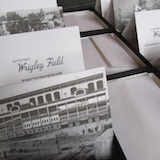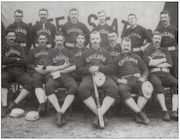 |
Card #1: CHICAGO WHITE STOCKINGS (1886)
CAPTION: A.G. Spalding, president of the Chicago White Stockings (precursor to the Cubs) and player-manager Cap Anson have an idea: Before the season, let’s send our players to train, hike and “boil out the alcoholic microbes” in the spas of Hot Springs, Arkansas. The team wins the 1886 pennant. Other owners see their success and follow suit. And, voila! Spring training is born. Stars of the 1886 team are future Hall of Famers Cap Anson (front, with bat), John Clarkson (front, third from left) and King Kelly (front, far left). Also of note is Billy Sunday (back row, far left), later an influential evangelist and advocate of Prohibition. The rest: Jocko Flynn, Jim McCormick, Silver Flint, Lou Hardie, George Moolic, Tom Burns, Fred Pfeffer, Ned Williamson, Abner Dalrymple, George Gore and Jimmy Ryan.
|
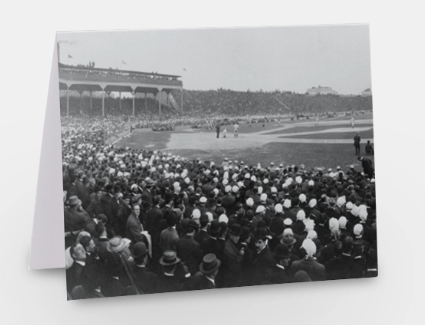 |
Card #2: A STRANGE SORT OF SERIES SWEEP (1907)
CAPTION: After 12 innings at West Side Park, Game 1 of the World Series against Detroit ends in the dark, a 3-3 tie. Things get even crazier here in the first frame of Game 2, when Chicago’s Jimmy Slagle wanders off third and is tagged out by Bill Coughlin on the old hidden ball trick. Ump Hank O’Day yells, “You’re out! Where did the ball come from?” It’s the only time this ruse has been executed in a World Series. Despite the gaff, Chicago wins this game (3-1) and the series (4-0-1), while allowing only three runs in the four wins and stealing 18 bases along the way.
|
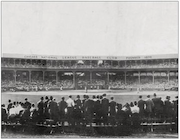 |
Card #3: WEST SIDE PARK (1908)
CAPTION: This panorama comes from a poster celebrating the back-to-back World Series wins of 1907 and 1908. Newspaper accounts report this team to be so dominant that fans say they are becoming bored. Little did they know it would be 108 years until their next World Series win. This second iteration of the park operates from 1893 to 1915, on a block bound by Taylor, Wood, Polk and Wolcott streets (now UIC Medical Center). It holds 12,500 – bigger than the first version (1885 to 1891), which had a trendy-at-the-time bicycle track. The structure comes down in 1920.
|
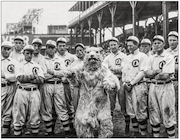 |
Card #4: MASCOT MANIA (1908)
CAPTION: On a hot summer day at West Side Park, an understudy from the Chicago play “Top O’ the World” decides to wear his polar bear costume to the game. The lead in that play is Arthur Hill, who achieved fame as the Cowardly Lion in the 1902 stage production of Wizard of Oz. This team, winners of the 1907 World Series, takes the title again in 1908, defeating the Tigers in five. From left to right: Jimmy Sheckard, Frank Schulte, Jimmy Slagle, Heinie Zimmerman, Joe Tinker (HOF SS, 1902-16), Carl Lundgren, Kid Durbin, The Polar Bear, Frank Chance (HOF 1B, 1898-1914), Del Howard, Johnny Evers (HOF 2B, 1902-17, 1922, 1929), Harry Steinfeldt, Orval Overall
|
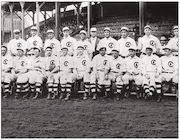 |
Card #5: WORLD SERIES CHAMPIONS (1908):
CAPTION: West Side Park is home to one of the most successful Chicago sports teams of the 20th century, with pennants in 1906, 1907, 1908 and 1910 and consecutive World Series wins in 1907 and 1908. Front row (left to right): Orval Overall, Mordecai “Three Fingers” Brown (HOF P, 1903-16), Del Howard, Johnny Kling, Johnny Evers (HOF 2B, 1902-17, 1922, 1929), Frank Chance (HOF 1B, 1898-1914), Joe Tinker (HOF SS, 1902-16), Jimmy Slagle, Jimmy Sheckard, Frank “Wildfire” Schulte, Solly Hofman. Back row: Heinie Zimmerman, Ed Reulbach, Chick Fraser, Jack Pfiester, Kid Durbin, Trainer Jack McCormick, Harry Steinfeldt, Carl Lundgren, Vin Campbell, Pat Moran.
|
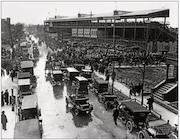 |
Card #6: WEEGHMAN PARK (1914)
CAPTION: The flamboyant Charles A. Weeghman, who made a fortune in the lunch counter business (aka fast food), builds this 14,000-seat park for his new Federal League team, the Chi-Feds. After only a year, the upstart league folds, so Weeghman buys Chicago’s West Side Park team. The new North Siders open at Addison and Clark on April 20, 1916. William Wrigley takes over in 1921 and, prior to the 1927 season, the park is dedicated as Wrigley Field. A new deck comes in 1927-28; bleachers, ivy and a hand-operated scoreboard in 1937. Small add-ons, such as the clock (1941), come over 40 years, capped by lights (1988), jumbotrons (2015) and a World Series win (2016).
|
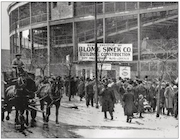 |
Card #7: THE FEDERAL LEAGUE (1914)
CAPTION: It’s Opening Day 1914 at brand new Weeghman Park, where Joe Tinker (of Tinker to Evers to Chance double-play fame) manages Chicago’s newest baseball team, the Federals (or Chi-Feds, as they don’t have a name yet) of the upstart Federal League. The club adopts the Whales moniker for 1915, then outlasts the St. Louis Terriers to win the pennant. The league folds, but circumstances allow Charles Weeghman to buy the local National League team and move it from decrepit West Side Park to his $250,000 gem. On April 20, 1916, the North Sider’s are home.
|
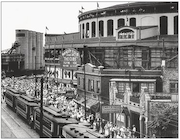 |
Card #8: CLARK STREET TROLLEY (1935)
CAPTION: Baseball fans arrive in droves via the Clark Street trolley. This particular streetcar line starts in 1859 – with horses – but only reaches Diversey, south of the stadium. By 1895, the line is electrified and, for 5 cents, riders can go from downtown to Devon. Maybe they should have charged more, because by 1957 buses rule the road. And by late 1958, the streetcars are gone. NOTE: This image is on the cover of "Images of America, East Lake View" (Arcadia Publishing, 2017, 128 pages) by Matthew Nickerson, who chronicles the rich history of the neighborhood that includes Wrigley Field.
|
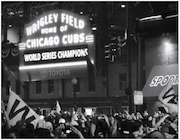 |
Card #9: THE MOMENT (2016):
CAPTION: Seconds after the North Siders take the 2016 World Series, thousands of jubilant and somewhat inebriated fans spill out of Wrigleyville bars – Merkle’s, The Cubby Bear, Sluggers and oh so many more – and stumble over to Clark and Addison. Here, for the first time ever, in front of an equally lit up Wrigley Field marquee, they will celebrate this World Series win to the wee hours.
|
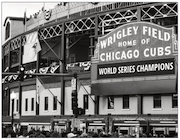 |
Card #10: 108 YEARS (2016)
CAPTION: The view from Clark and Addison streets of the 2016 World Series Champions marquee celebrates the North Siders drama-filled seven game win over the Cleveland team formerly known as the Indians. It is their first World Series win since 1908, capping 108 years of futility, bad luck, curses and, generally speaking, a seemingly endless string of really poor decisions.
|
